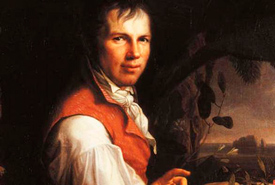Celebrating the father of environmentalism

Alexander von Humboldt, 1806 by Friedrich Georg Weitsch
Do you know who has more places named after themselves than anyone else in history? Can you guess the eponymous hero who has close to 300 plants and more than 100 animals with the same namesake? Maybe you have heard of a town, river, lake or mountain named after him, or perhaps a penguin or squid.
Alexander Von Humboldt, born September 14, 1769, in Berlin, Germany, has been praised as one of the most famous and important scientists of the 18th century. However, many have not been exposed to his brilliance.
What was so remarkable about Humboldt was his approach to understanding nature on a global scale, and his thirst for knowledge in all subjects. Rather than focussing solely on zoology, astronomy, geology, botany or chemistry, he studied each of them and eventually incorporated them all into his world view. Through this interdisciplinary approach, he had a deep understanding of weather patterns, human migration, comets, species distributions and the Earth's core, along with many of their interconnections. Furthermore, he discovered the magnetic equator and invented the temperature and pressure lines, known as isotherms, still used on maps today.
Humboldt was a strong proponent of immersing oneself within nature, as one cannot fully understand a subject without truly experiencing it. His life was full of adventure and excitement, with journeys that saw him climbing the Andes to peer inside active volcanoes, or travelling for 75 days down the Orinoco River in Venezuela to map its linkage to the Amazon River. Even at 60 years old, he was taking off on a 10,000-mile expedition into isolated regions of Russia!
His interpretation of the natural world brought about giant leaps in environmental understanding, along with its appreciation and perhaps most importantly its conservation. His influence ran deep with other champions of nature, including Charles Darwin, John Muir, Henry David Thoreau, Ernst Haeckel, Ralph Waldo Emerson, George Perkins Marsh and Johann Wolfgang Goethe.
Humboldt recognized the impact that natural resource extraction had upon the landscape and the global climate and the importance that such knowledge be made accessible to everyone. His work has been published in multiple languages. Not only did he inspire those within the scientific community, but his writing reached a wide-ranging audience across the globe, including labourers, artists, monarchs, revolutionaries, teachers, poets and politicians.
Humboldt saw the unifying power of science between countries, even while the very same nations were at political war. He was instrumental in creating an international scientific community that exchanged data, which allowed for worldwide comparisons to be made and global patterns to be revealed. In order to complete his final project, Humboldt appealed to scientists around the world to send him their findings. Eager to have one of the greatest scientists of the time looking over and using their work, Humboldt received scores of information from experts far and wide. What resulted was a multi-volume publication titled Kosmos. The book was regarded as the scientific bestseller of the age, and the first edition sold out within two months.
While Humboldt had been discussed briefly in some of my university classes, it wasn't until I read Andrea Wulf's biography of Humboldt, The Invention of Nature, that I came to fully appreciate how significant was his influence on how we see the natural world today. I encourage those who are intrigued by Humboldt to read this incredible book, and join me in celebrating this extraordinary scientist born exactly 248 years ago today!


